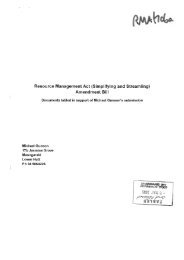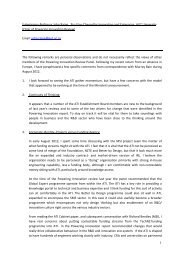Full evidence text [PDF 8908k] - New Zealand Parliament
Full evidence text [PDF 8908k] - New Zealand Parliament
Full evidence text [PDF 8908k] - New Zealand Parliament
Create successful ePaper yourself
Turn your PDF publications into a flip-book with our unique Google optimized e-Paper software.
The Lugtons demonstrate a clear appreciation of balancing environmental care with<br />
economic viability. Commented the award judges: "They are very knowledgeable and have a<br />
very good grasp on what sustainability means to them."<br />
Phil and Jackie have been<br />
sharemilking on Derek and<br />
Daphne's two farms west<br />
of Matamata for the past<br />
three seasons. With a total<br />
of five labour units they milk<br />
880 cows, but the 132 ha<br />
(125ha effective) home farm<br />
at Walton, on which they<br />
calved 440 cows this season,<br />
is the subject of their entry<br />
into these awards.<br />
The judges paid tribute to the prolonged effort of the Lugton<br />
family in farm enhancement and protecting waterways, noting<br />
their estimate of up to 8,000 trees planted. Wrote the judges:<br />
"The planting on the property was superb. This has been<br />
achieved through hard work and dedication. The swamps and<br />
ponds have been created in wet areas and although they are<br />
lovely to look at they have also been designed to have afiltering<br />
effect for any run−off that may occur."<br />
The judges identified a key factor in the success of the Lugton<br />
family's farming operation was their shared environmental<br />
awareness. For Derek, that has meant farming carefully, and<br />
well. Phil's addition to the mix has brought about an even<br />
sharper environmental focus via both Phil's personal interest<br />
and his specific knowledge gained studying ecology and parks<br />
management at Lincoln University.<br />
Prior to coming home to sharemilk, Phil was a park ranger for<br />
the Auckland Regional Council. The job included farming 1200<br />
stock units of sheep and beef under environmental best practise<br />
principles. Upon taking up sharemilking Phil, in consultation with<br />
his parents, began a trial of biological farming systems on 30haof<br />
the home farm. The results, so far, are promising, says Phil. "But<br />
it wil[ have to stack up financially, not just environmentally."<br />
The judges praised this initiative, noting it demonstrated a<br />
strong ability to "think ahead and plan" and an effective family<br />
working relationship. "Although they all have slightly different<br />
ways of doing things they complement one another with their<br />
different strengths. They were very respectful of one another<br />
and were willing to listen to each other's opinions."<br />
With water protection and minim!sing the impact of effluent<br />
and farm run−off a priority, protecting waterways is ongoing.<br />
They have replaced a travelling irrigator with a pod system. "It's<br />
all on a timer system so we can control the depth of effluent<br />
application, says Phil. "It gives us much better management<br />
options whatever the weather."<br />
Phi[ has also overhauled the rubbish system on both farms. All<br />
households contribute to the domestic recycling collection<br />
and silage wrap is recycled through the Plasback scheme. There<br />
are no longer any farm dumps, "they only create a problem for<br />
the future".<br />
Phil and Jackie have two sons, Fletcher (4) and Harrison (2) and<br />
twins "on the way"


![Full evidence text [PDF 8908k] - New Zealand Parliament](https://img.yumpu.com/14025494/4/500x640/full-evidence-text-pdf-8908k-new-zealand-parliament.jpg)



![−3 JUN 2009 IRELEASED] - New Zealand Parliament](https://img.yumpu.com/12829724/1/185x260/3-jun-2009-ireleased-new-zealand-parliament.jpg?quality=85)
![Full paper text [PDF 3515k] - New Zealand Parliament](https://img.yumpu.com/11267192/1/184x260/full-paper-text-pdf-3515k-new-zealand-parliament.jpg?quality=85)


![Full evidence text [PDF 9k] - Parliament](https://img.yumpu.com/7938085/1/184x260/full-evidence-text-pdf-9k-parliament.jpg?quality=85)





